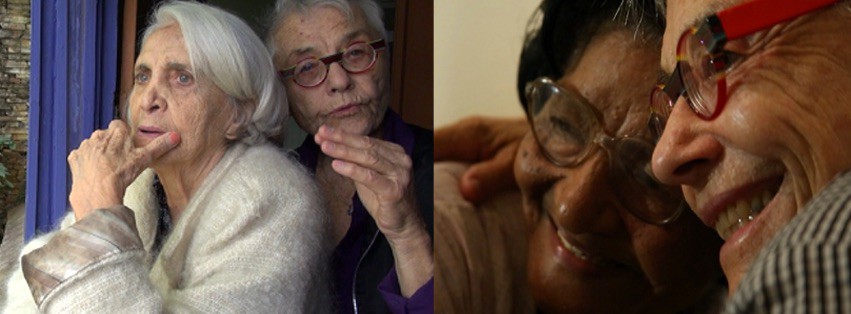A highly prolific filmmaker
and videographer, Barbara Hammer has directed over eighty films and videos in a
career that spans 40 years. She is considered a pioneer of queer cinema. Hammer made the world’s first lesbian films in 1974 (“Dyketactics”) and 1976
(“Women I Love”). In 2013 she received a Guggenheim Fellowship for the film “Waking Up Together” on the poet Elizabeth Bishop. That same year, she was awarded a Marie Walsh Sharpe artist studio to work on
performance projection. (Press materials)
“Welcome to This House, a Film on Elizabeth Bishop” will premiere at the 2015 Inside Out Film Festival in Toronto on May 30.
W&H: Please give us your description of the
film playing.
BH: With [my] latest work, [I] examine the little-known aspects of the life of the
Pulitzer Prize-winning American poet Elizabeth Bishop (1911–1979). [My film] explores Bishop’s inner life through
some of the homes in which she lived and wrote — from childhood to her final
days — and through the more private and sensorial poems that were published after
her death. Featuring music composed and performed by the experimental singer
and musician Joan La Barbara; Bishop’s intimate poems read by Kathleen
Chalfant; three actors representing Bishop’s physical presence at different
stages of her life; and interviews by historians, poets, and students, “Welcome to This House” sensitively portrays a complex, private and challenging
writer whose poetry continues to inspire.
W&H: What drew you to this story?
BH: The poetry of Elizabeth Bishop, especially
the recently published “Uncollected Poems” probably not meant for publication,
poems that were more intimate than those she released. And the hidden female lovers of this artist
of the ’40s and ’50s when the closet was the norm. I wanted everything to be as much in the open
as possible: the intimate poetry and loves.
W&H: What was the biggest challenge in making
the film?
BH: Arranging the multiple location shoots in
Brazil, a country I’d never visited with a language I didn’t know. The key was finding the right people with
their generous hearts so that one connection led to another and, with the help
of a production assistant, former NYU Brazilian student Juliana Pamploma, we
were able to structure together a ten-day schedule of three different homes in three different cities and multiple interviews with people who were still alive and
who either knew her or had studied her life and poetry. It was tight, but we were picked up and moved
with competent drivers and the owners of Bishop’s former homes, who welcomed us into
their houses.
W&H: What do you want people to think about
when they are leaving the theatre?
BH: Several things: 1) How we can never know
everything or even approach knowing everything about a person, a location, an
architecture, a historic period; 2) How complex film can be and, with that depth
and layered meanings can come a desire to see the film again and again; 3) How
film lends itself to the essay and poetic literary traditions, yet is all of
itself a “poetic essay” or an “essay on poetry, architecture,
and hidden biographies.”
W&H: What advice do you have for other female
directors?
BH: Trust yourself, your intuition, your desires and your pursuits. Don’t question yourself
too much. Place one foot ahead of the other and go forward steadily. No one
will understand as you do the work, the art, you are making — so no need to look
for audience approval or ratings.
All
this is spoken to the female director who wishes to be an independent film
artist dedicated to making the best work she knows how without commercial
interest or purpose. Film as an art form
cannot advance tied to the industry.
I
am talking here of cottage filmmaking, where the heart is the hearth and the
emotions are the cement holding together your personal, idiosyncratic and so
unique way of constructing the ever-evasive and tantalizing art form named film.
W&H: What’s the biggest misconception about you
and your work?
BH: That it is made and meant for a queer
audience, that it is so experimental as to be inaccessible, that the 80+ films
are homogeneous and that there haven’t been periods, styles and concerns that
mark my 40+ year career.
W&H: How did you get your film funded? Share some insights
into how you got the film made.
BH: My film was made with the generous grant of a
Guggenheim Fellowship, which I was able to take in two separate payments over a two-year period. I got the film made
through perseverance. First, I applied for a Guggenheim at least 10 times
before I got the notification that this time ,I’d succeeded. But I also must
admit that I worked harder on the grant application than on any of the other times by conducting interviews, shooting locations and editing my sample in a month
of hard and daily work. It was a sweat, but it was worth it.
W&H: Name your favorite woman-directed film and
why.
BH: Unfair question! If I say Maya Deren’s “Meshes of the
Afternoon,” then I only name a film most cinephiles already know; if I say
Claire Denis’s “Beau Travail,” I will surprise with the male-centric foci;
if I say Lizzie Borden’s narrative “Born
In Flames,” I have to add the
non-narrative experimental films of Mairie Mencken, Deborah Stratman, Jennifer
Reeder and the “newly avant-garde” of Jenni Olson.







